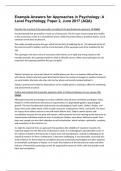Example Answers for Approaches in Psychology: A
Level Psychology, Paper 2, June 2017 (AQA)
Describe the structure of the personality according to the psychodynamic approach. (4 Marks)
Freud proposed that personality is made up of three parts. The id is pure sexual energy that resides
in the unconscious mind; it is controlled by drives, which Freud described as primitive desires, and it
functions on the basis of pleasure.
The reality principle governs the ego, which has the duty of subduing the id. The demands of the id,
the external world's realities, and the moral demands of the superego must all be mediated by the
ego.
The superego is the inner voice of conscience that informs us of right and wrong: Based on the
morality principle, the superego stands for what is ethically correct. When moral principles are not
respected, the superego punishes the ego (via guilt).
Tatiana’s parents are concerned about her mobile phone use. She is an anxious child and has low
self-esteem. Tatiana only feels good about herself when she receives messages or positive comments
on social media. She feels safe when she has her phone and socially isolated without it.
Tatiana’s parents worry that her dependence on her mobile phone is starting to affect her well-being
and achievement at school.
Outline and evaluate the humanistic approach. Refer to Tatiana’s behaviour in your answer. (16
Marks)
Although humanistic psychology has various subfields, they all draw on Maslow and Rogers' ideas.
Maslow's (1943) well-known hierarchy of requirements is a dependable guide to psychological
growth. The most fundamental requirements are physiological: food, water, clothes, shelter, and
sleep. Next come safety needs, which include resources, employment, family, and health. The need
for respect from others and one's own self-worth follows that. Tatiana cannot achieve self-
actualization because she has poor self-esteem, which prevents her from moving up the hierarchy of
requirements until these needs are met. According to Maslow, once these ‘deficiency needs’ have
been met, people can turn their attention to self-actualisation, which includes, spirituality, creativity
and acceptance of the world as it is.
As might be expected from an approach that questions the reliability of empirical research, the
empirical support for the hierarchy of demands is weak. It is challenging to operationalize some of
the notions included in the hierarchy of wants (such self-actualization), making it challenging to do
empirical research on them. Furthermore, it becomes challenging, if not impossible, to provide any
study evidence for these ethereal conceptions because humanistic psychologists are often opposed
to nomothetic techniques of inquiry. As a result, the existence of the hierarchy of needs and other
features of humanistic psychology cannot be supported by research, which calls into question such
ideas and conceptions.




